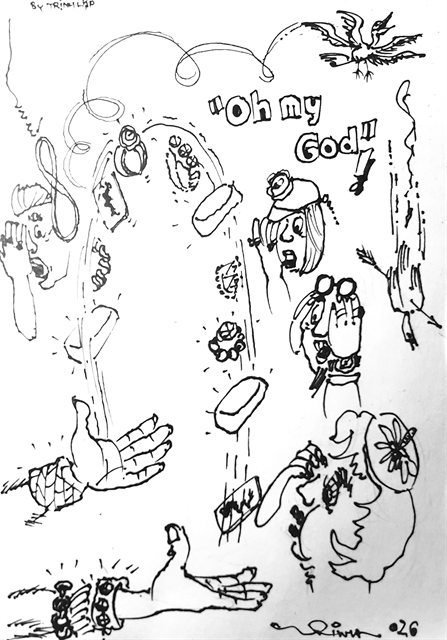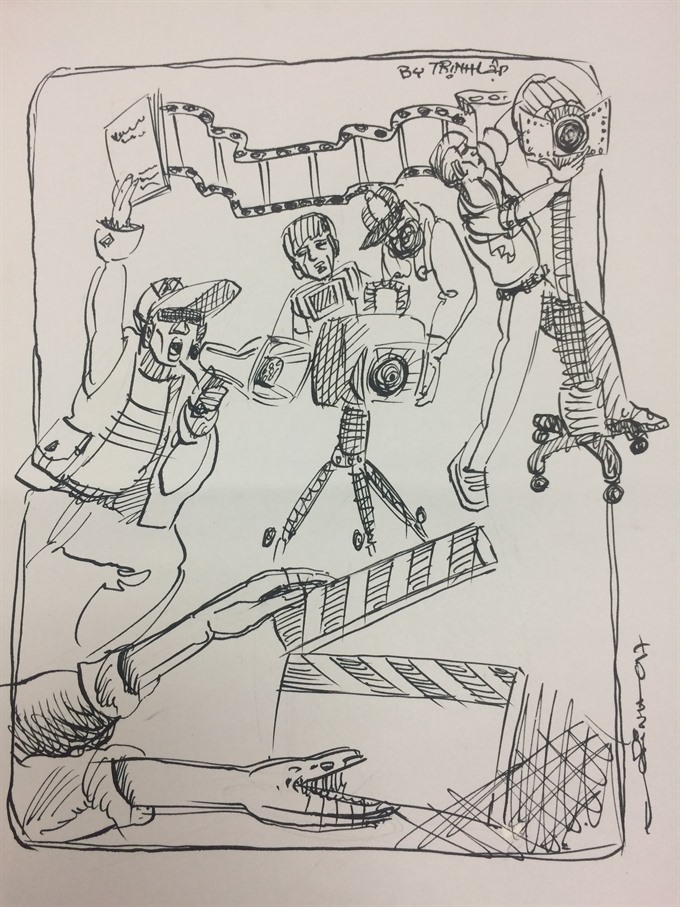 Talk Around Town
Talk Around Town

The author has seen more and more young Vietnamese filmmakers, in particular those who are independent, telling stories filled with violence and prostitution.
 |
By Bạch Liên
I recently watched the film Big Father, Small Father and Other Stories by Phan Đăng Di, when it was screened in Hà Nội as part of the 8th Francophone Film Festival.
I had high expectations for the film after learning of its successes. It was screened in the main competition section of the 65th Berlin International Film Festival in 2015, and won the Jury prize at the Three Continents festival in Nantes, France. The film got financial support from the Berlinale World Cinema Fund.
The screening proved to be popular, as it was the first time the film was officially presented to the Vietnamese public, and the director would be answering questions at the end.
Without knowing much about the film’s themes, I was shocked by the very permissive nature of Vietnamese society portrayed on screen. A 1990s HCM City is shown seething with risqué nightclubs, gambling dens and drug-peddling gangsters. The film revolves around the suppressed desires of a group of young men and women in HCM City and the Mekong Delta region. They face violence, prostitution and drugs on a daily basis.
To my disappointment, I struggled to understand many of the film’s scenes. A number of them were filmed in darkness, and I was unable to see or make out what was happening.
After the credits rolled, director Di spent a lot of time explaining the film’s message, and clarifying some of the more confusing scenes.
As Di explained, he knew in advance that the film may be difficult for some viewers to understand. He said that even in Europe where audiences are generally more familiar with arthouse cinema, many people did not understand the film either.
Even after listening to the director’s reasoning, I was still unmoved by the piece. Perhaps it just wasn’t to my taste. But I was in the minority amongst my fellow cinemagoers. While some teenagers sitting next to me said they appreciated the film because of its gritty realism, others my age (mid-thirties) and older weren’t so impressed. We expected a more optimistic tale.
I agree that Vietnamese society has problems of violence and depravity like any other, but Big Father, Small Father and Other Stories was a bleak slog from beginning to end, showing only the dark side of the city.
When asked why he is so pessimistic on Vietnamese society, Di surprised me by saying that he had “not found any joyful themes in Việt Nam to make a film about it”.
Dark stories told by young directors
This is far from the only Vietnamese film I’ve seen that seeks to put the country’s permissive society on screen.
I’ve seen more and more young Vietnamese filmmakers, in particular those who are independent, telling stories filled with violence and prostitution.
While those films are appreciated by foreign audiences, they are not always warmly welcomed by local audiences.
Di’s short film Khi Tôi 20 (When I am 20) was banned in Viet Nam after it was screened at the Venice Film Festival in 2008. Authorities were concerned that the film could damage the country’s image.
At a 2014 conference about ethics in literature and the arts in HCM City, Nguyễn Hồng Ngát, vice president of the Viet Nam Cinema Association, said that when she watched films by young independent filmmakers who get support from foreign cultural funds, she felt unable to connect to the stories or characters portrayed in those films.
“Sometimes I see that the characters do not respect traditional culture and follow unsafe lifestyles. I don’t know where they come from.”
“In films screened over the last few years, I see an absence of positive role models with admirable ideas.”
“Previously, 20-year-olds were eager to fight against foreign invaders, ready to sacrifice their youth and life for national freedom.”
“Now, in several films, the same young people are concerned with sex and drugs. The characters enjoy money, without any shame.
"A good film has a good message, and teaches valuable life lessons to audiences."
The absence of positive heroes can be also seen in the film Mất Xác (Missing Corpse) by young independent filmmaker Đỗ Thành An. The film portrays a depraved doctor and young woman living by a river. Also, Scandal- Hào Quang Trở Lại (Scandal 2) shows the dark side of the showbiz.
Recently, young independent filmmaker Nguyễn Hoàng Điệp won plaudits abroad with her work Flapping in the Middle of Nowhere which was controversial among Vietnamese audiences.
Several foreign and Vietnamese film critics have referred to the film as “shocking”.
The drama, set in Ha Noi, centres on sexual obsession in the lives of young people and comprises a transgender character, and a pregnant teenager who has to work as a prostitute to be able to afford an abortion since the young father is out of work. The emerging filmmaker has also begun to make another film entitled The Saddest Story Ever Told about sexual abuse, focussing on the relationship between sex and violence, in which women are both victims and culprits.
Điệp said that she was “pessimistic about durable happiness, doesn’t believe in happiness of women”, and for her, “life is sad”.
Just a question of taste
I am not criticising the thematic choices of these young filmmakers. I think it’s their right to choose angles that reveal new and original angles of society.
To like, or dislike, those films depends on the tastes of the audience.
Personally, I agree with Ngát. I also think that a good film should teach moral lessons to audiences, and allow viewers to enjoy some optimism.
I would be proud to show my foreign friends films which highlight romantic and heartwarming stories from Việt Nam. Many foreigners may not know Vietnamese culture, so films screened abroad may be their first introduction to the country.
Different people have different reasons to watch films. For me, when I watch a film, it’s not only to laugh for an hour or two. I hope to learn something new, and take something positive and interesting from the experience. I believe that Việt Nam still has many uplifting stories that filmmakers can explore and draw upon to make excellent works.
I love the films by veteran filmmaker Đặng Nhật Minh which highlight the inner beauty of the protagonists, the peaceful landscapes of the country and the hope for a better life.
I also love the recent film Hoa Vàng Trên Cỏ Xanh (Yellow Flowers on the Green Grass) by overseas Vietnamese director Victor Vũ. This particular piece presents Viet Nam’s pristine scenery, landscapes and local hospitality, helping to promote tourism in Phú Yên.
I still remember the words of Aruna Vasudev, founder and president of the Network for the Promotion of Asian Cinema and member of the consulting board for the second Hà Nội International Film Festival in 2012.
“Twenty years after watching war films like Thương Nhớ Đồng Quê (Nostalgia for the Countryside) by Đặng Nhật Minh, I am still touched. Vietnamese directors should produce more of such works,” she said.
“Cinema is an excellent vehicle to help people get to know other countries and people. It’s Vietnamese cinema that attracted me to Việt Nam.”
This is, after all, just the opinion of a traditional film fan, who isn’t getting any younger. VNS